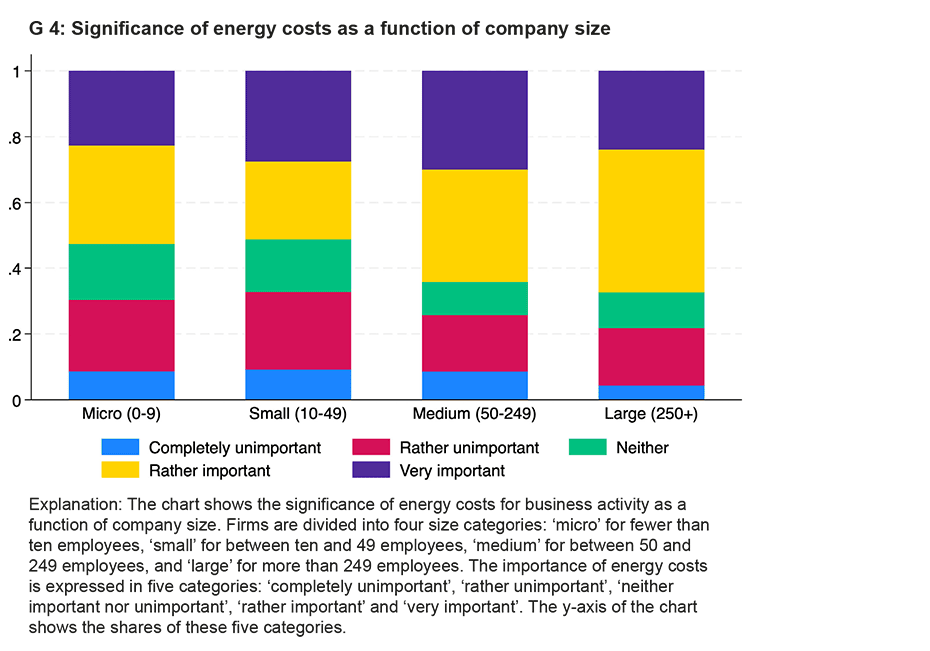
How relevant are energy prices really for firms?
The sharp rise in energy prices since 2022 has led to much debate. But how important are energy prices really for companies? And through which channels are companies exposed to energy prices? To answer this question, researchers from KOF, EPFL and the University of Lausanne conducted a company survey funded by the Enterprise for Society (E4S) Foundation and the MTEC Foundation.
A total of 882 Swiss firms took part in the online survey between mid-June and mid-August 2023. The sample for this analysis was restricted to private-sector businesses. Sports clubs, for example, were excluded from the sample, which the Federal Statistical Office categorises in the Swiss corporate population as belonging to the ‘arts, entertainment and recreation’ sector. This left 737 respondents.
Respondents were asked what percentage of their firm’s total operating costs in 2022 was spent on energy (e.g. electricity, fuel and other oil or gas products). This was partly intended to determine whether the importance of energy prices reported by companies could be explained by their direct energy costs.
The responses showed that this percentage is often low, with energy accounting for only 3 per cent of total operating expenditure for the typical firm (median). However, one in ten respondents stated that their organisation spends 14 per cent or more of their total expenditure on energy.
Taking these responses at face value, one might think that the level of energy prices is of secondary importance for Swiss companies, as their direct share of expenditure is fairly small for most firms. However, energy prices can also have an impact through other channels, e.g. via the cost of intermediate inputs, or they can affect the demand for companies’ products and services.
In order to directly measure the subjective significance of energy prices for their business, respondents were asked to rate the importance of the following five factors that “may play a role in your costs or the demand for your products/services”: (i) exchange rates (e.g. Swiss franc to euro), (ii) the general level of interest rates in Switzerland, (iii) the general level of prices/inflation in Switzerland, (iv) energy costs and (v) the average level of wages in Switzerland over time.
Energy costs are important for more than half of firms
Overall, 54 per cent of respondents stated that energy costs are either fairly or very important for their company, while 30 per cent of respondents said that energy costs are either fairly or totally unimportant. When compared with other factors, energy prices are less important than both wage inflation and price inflation (77 per cent and 75 per cent of firms respectively consider these to be either very or fairly important) and interest rates (62 per cent) but are still more important than the exchange rate (42 per cent). Chart G 4 shows the importance of energy costs for businesses of various sizes. This reveals that energy costs are more important for larger firms than for smaller ones.
Econometric analysis based on the total responses received reveals several findings. The cost structure plays a role here, as companies in the industrial and construction sectors – as well as firms with a higher proportion of energy costs in general – usually consider energy costs to be more important. However, this cannot explain why the majority of managers consider energy costs to be important despite their low share of total costs. Further analysis reveals that energy costs are considered particularly important by those businesses that are exposed to intense competition within their sector.
Firms were also asked about their recent experience of energy costs. The typical company saw a 10 per cent increase during the twelve months prior to participating in the survey. However, these changes in energy costs were unevenly distributed across businesses, with one in ten firms seeing an increase of 40 per cent or more. Interestingly, managers who had experienced a larger rise in energy costs also reported a higher importance of energy costs, suggesting that the significance reported is related to managers’ recent experiences and can change quickly. These firms are also more uncertain about the future level of energy costs. Both the sharp price increase and the high level of uncertainty pose a direct threat to the future profitability and investment decisions of these companies.
Rising energy costs jeopardising investment
Given their cost structure, some firms are highly dependent on energy costs or have experienced very sharp rises in these costs. Increases in energy costs pose a direct threat to these businesses’ investments via two channels. Firstly, their internal resources may be depleted by the higher costs. And, secondly, these companies become more uncertain about the future level of energy costs, which could reduce their investment demand.
Contacts
KOF Konjunkturforschungsstelle
Leonhardstrasse 21
8092
Zürich
Switzerland

